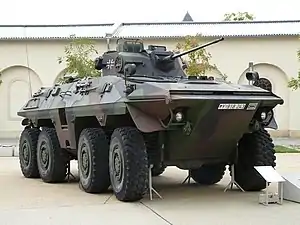| Spähpanzer Luchs | |
|---|---|
 Bundeswehr Luchs in a military history Museum in Dresden | |
| Type | Reconnaissance vehicle |
| Place of origin | West Germany |
| Service history | |
| In service | 1975–2009 |
| Production history | |
| Designer | Daimler-Benz Porsche Thyssen-Henschel |
| Designed | 1968–1974 |
| Unit cost | $293,000 (1975) |
| Produced | 1975–1977 |
| No. built | 408 |
| Specifications | |
| Mass | 19.5 tonnes |
| Length | 7.74 m |
| Width | 2.98 m |
| Height | 2.84 m |
| Crew | 4 |
Main armament | 20 mm Rheinmetall MK 20 Rh 202 automatic cannon |
Secondary armament | 7.62 mm MG3 machine gun |
| Engine | DaimlerBenz OM 403A 10-cylinder 4-stroke, turbocharged. 300 hp with petrol, 390 hp with diesel |
| Power/weight | 15,38 hp/ton with petrol, 20 hp/ton with diesel |
| Suspension | hydraulic all (8) wheel drive |
Operational range | 730 km |
| Maximum speed | 90 km/h on roads, 10 km/h swimming in water |
The Spähpanzer Luchs (English: Scout Armored Car "Lynx") is a German 8x8 amphibious reconnaissance armoured fighting vehicle (Spähpanzer) that was in service from 1975 to 2009 with the German Army, who used 408 in their armoured reconnaissance battalions. It was developed by Daimler-Benz[1] between 1968 and 1975, replacing the M41 and the Schützenpanzer SPz 11-2 Kurz.[2]
Design
.jpg.webp)
In the 1960s, the German Ministry of Defence developed a requirement of an Eight-wheel drive reconnaissance vehicle, part of a series of 4 X 4, 6 X 6 and 8 X 8 military vehicles planned for the German Army. Competing designs were produced by Daimler-Benz and a consortium of Büssing, Klöckner-Humboldt-Deutz, Krupp, MAN and Rheinstahl Henschel, with nine prototypes produced of each design from 1968. After extensive testing, in January 1971 the Daimler-Benz design was selected for production.[3] In December 1973, Rheinstahl Wehrtechnik (later Thyssen-Henschel and now part of Rheinmetall) received an order for 408 of the new vehicle, designated Spähpanzer Luchs.[3][4]
The all-wheel drive Luchs made by Thyssen-Henschel (now: Rheinmetall) is well armoured, has an NBC protection system and is characterized by its low-noise running. The eight large low-pressure tyres have run-flat properties. At speeds up to about 50 km/h, all four axles can be steered. As a special feature, the vehicle is equipped with a rear-facing driver with his own driving position. Up to the first combat effectiveness upgrade in 1986, the Luchs was fully amphibious and could surmount water obstacles quickly and independently using propellers at the rear and the fold back trim vane at the front.
The 20 mm Rheinmetall MK 20 Rh 202 gun in the turret is similar to the one in the Marder IFV. The upgrade to the Luchs A1 starting in 1986 included the incorporation of a thermal observation and gunnery system, which replaced the original infrared/white light night vision system mounted to the left of the turret. VHF radios have been the German SEM 25 / SEM 35 FM short range radios from LORENZ. HF long-range radio was the AN/GRC 9 with the LV 80 100 Watts RF amplifier for Morse Code. This was replaced by the XK 405 100 Watts SSB HF radio made by Rohde&Schwarz in Germany and the incorporation of the new SEM 80/90 radio system gave it the designation SpPz 2 Luchs A2. The Luchs was replaced by the Fennek in Bundeswehr service.
References
- Foss, Christopher F., ed. (1979). Jane's Armour and Artillery 1979–80. London: Jane's Yearbooks. ISBN 0-354-00588-X.
- Foss, Christopher F., ed. (2011). Jane's Armour and Artillery 2011–2012. Coulsdon, UK: IHS Jane's. ISBN 978-0-7106-2960-9.